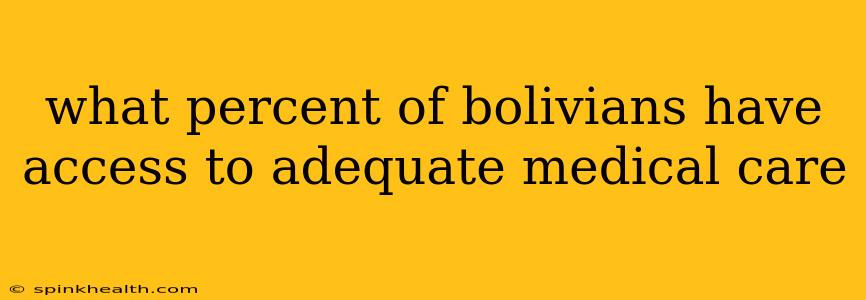The Unequal Landscape of Healthcare Access in Bolivia: A Look at the Numbers
Bolivia, a land of stunning Andean landscapes and vibrant cultural traditions, faces a complex challenge in ensuring equitable access to adequate medical care for its population. While significant strides have been made in recent decades, a considerable portion of the population still lacks access to the quality healthcare they need. Pinpointing a precise percentage is difficult due to the constantly evolving nature of healthcare infrastructure and data collection challenges, but let's delve into the factors influencing the accessibility of medical care in this South American nation.
My research suggests that while the Bolivian government has implemented various initiatives to improve healthcare accessibility, the reality on the ground remains nuanced. Access to adequate medical care is far from uniform across the country, varying significantly by geographic location, socioeconomic status, and ethnicity. Instead of a single percentage, it's more accurate to paint a picture of disparities.
What factors contribute to unequal access to healthcare in Bolivia?
Several factors significantly impact the accessibility of adequate medical care in Bolivia. Let's explore some key aspects:
Geographic Location: Bolivia's diverse geography, ranging from the high Andes to the Amazon rainforest, presents a significant logistical hurdle. Remote rural communities often lack adequate infrastructure, including roads, electricity, and communication networks, making it difficult for healthcare professionals to reach them and for patients to access facilities. This disparity translates to poorer health outcomes for those living in isolated areas.
Socioeconomic Status: Poverty remains a widespread issue in Bolivia, and this directly impacts healthcare access. Many low-income families cannot afford the cost of transportation, medications, or even basic consultations, often resorting to traditional medicine or delaying treatment until it's too late. This financial barrier significantly limits their access to adequate healthcare services.
Ethnicity: Indigenous populations in Bolivia often face systemic discrimination, leading to reduced access to quality healthcare. Language barriers, cultural differences, and a lack of culturally sensitive services can create obstacles that prevent them from receiving the care they need.
Availability of Healthcare Professionals: Bolivia faces a shortage of qualified healthcare professionals, particularly in rural areas. This shortage further exacerbates the challenges of providing adequate medical care to all citizens, leading to longer waiting times and limited access to specialized services.
Quality of Healthcare Services: Even when access to healthcare facilities exists, the quality of care can be inconsistent across the country. Resource constraints, limited training for healthcare workers, and a lack of modern medical equipment contribute to subpar healthcare services in many areas.
What initiatives are in place to improve healthcare access in Bolivia?
The Bolivian government is actively working to address these challenges through various initiatives:
- Expansion of healthcare infrastructure: The construction and improvement of healthcare facilities, particularly in rural areas, are ongoing efforts to increase accessibility.
- Training and recruitment of healthcare professionals: Programs aimed at increasing the number of qualified healthcare workers are crucial to address the shortage.
- Financial assistance programs: Initiatives to support low-income families in affording healthcare costs are intended to reduce financial barriers.
- Community-based healthcare programs: Integrating healthcare services into communities through mobile clinics and community health workers is designed to improve access in remote areas.
What is the future of healthcare access in Bolivia?
The future of healthcare access in Bolivia hinges on sustained and collaborative efforts from the government, international organizations, and civil society. Addressing the underlying issues of poverty, inequality, and geographic isolation is vital to achieving truly equitable access to adequate medical care for all Bolivians. Continuous investment in infrastructure, healthcare professionals, and innovative service delivery models will be critical in bridging the healthcare gap and ensuring that all citizens have the opportunity to lead healthy and productive lives. While a precise percentage of Bolivians with access to adequate healthcare remains elusive due to data limitations and complexities, the focus should remain on improving access and the quality of services for those who currently lack it.

